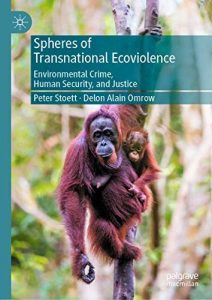
“In many ways, and from the vantage point of future generations, present action and lack of action around climate change will most likely constitute the gravest of transnational environmental crimes … Yet, things continue much as they have, the status quo is maintained, and the harms add up.”
-“The Criminology of Climate Change.” by R. White
Climate Change from a Criminological Perspective (pp. 1–11). New York, Springer-Verlag
Introduction
Around the world, our environment is in deep peril. It has become increasingly difficult to envision a future for us, our children, our grandchildren, and our planet itself. Biodiversity loss, massive exploitation of natural resources, toxic pollution of land, air, water and sea, and ozone layer depletion are some of the causes of this perilous situation. Climate change, new diseases, and the rapid endangering of numerous species are the most apparent signs of this global disaster.
Peter Stoett and Delon Alain Omrow’s Spheres of Transnational Ecoviolence: Environmental Crime, Human Security, and Justice is a comprehensive book that makes us face the facts of ecoviolence. Through seven extensive chapters, the book looks into several planes of ecoviolence- illegal wildlife trade, disposal and transport of hazardous waste, oceanic violence, floral violence, and climate ecoviolence, while incorporating how they impact global human security and environmental justice as well. Readers get a true sense of the extent of the crimes against the environment through sundry case studies on turtles, macaws, Australian wildfires, illegal fishing in Africa, and Mexico’s avocado farms and their connection with drug cartels.
The global pandemic that has shaken the world and killed over 62 Lakh (and counting) has origins linked with transnational ecoviolence. There is not enough research-backed proof, but scientists have placed their bets on the illegal trade of Chinese Pangolins as the beginnings of the zoonotic virus. What started as the exploitation of an animal for its exotic value, scales, and meat, has turned into a global crisis that plunged the economy and shattered political systems.
A Human-Inflicted Catastrophe and its Perpetuation
While we can think back to many of our actions that have threatened our planet’s existence, two facets often overlooked are the political and economic situations in countries with the worst ecological crises. People in these regions either live in crippling poverty, lack good governance practices, public safety and security, financial support, and health and educational services, or are pushed into this due to illegal ecological activities. The book draws an interesting and time-sensitive connection between these environmental crises and their impact on global human security.
Environmental injustice is the disproportionate exposure of communities of colour and lower economic backgrounds to pollution- its health and ecological impacts, and unequal environmental protection and quality provided through laws and policies. Environmental justice and human issues like food security are seriously threatened when nature’s shared resources are exploited for wealthy markets. As long as public demand remains in the market, exploitation of natural resources continues, allowing for forced labour, child labour, organized crime, and other forms of violence extending transnationally.
Facts from the Book
Spheres of Transnational Ecoviolence introduces readers to the hidden realities behind some of the bestselling products on the market. A few examples from the book are:
Some species like the great whales and pangolins have been exploited to near-extinction for the sake of high society. Pangolin scales are turned into high-fashion jewellery. In Africa, their meat is served as a delicacy, while in China, their entire bodies are used for their supposed healing properties as per Chinese medicine. Pangolin foetuses are also used for this purpose. Some animals and birds like Orangutans and Hyacinth Macaws are held in captivity and smuggled to be sold at high prices as ‘exotic pets’, potentially threatening their genetic makeup.
Multinational companies from wealthy countries rely on poorer nations for their market goals. These nations are usually rich in natural resources. Such multinational companies know how to exploit them without getting caught in the web of international policies made to protect these countries and their resources. This doesn’t end with just the extraction of resources from these precious forests. These same companies also choose to dump their post-production hazardous waste in the poorer nations, leaving entire populations to suffer the consequences- generation after generation. Cancers and genetic alterations leading to birth deformities are commonly seen in these areas. Along with impacting the environment, this form of waste disposal threatens the livelihoods of indigenous people that rely on natural resources for their food, health, and income. With this gone, the entire population comes face to face with severe poverty and drug abuse, and, ironically, end up looking for work with the same corporations that brought them to this position.
Illegal fishing is another notorious form of transnational violence. Boats cross into protected territories by finding loopholes to avoid getting caught. In the isolation of the sea, crimes easily go unnoticed. Trafficking, slavery, child and forced labour, rapes, and murders thrive in this space. Massive global businesses rely on such forms of illegal activities for their stocks. Fishmeal and canned seafood very often contain endangered species caught illegally.
Global increase in Avocado consumption has turned into a fertile ground for criminal gangs in Mexico. These gangs aim to monopolize these farms by collecting exorbitant taxes from the farmers and claiming to provide security. Those who deny these services are murdered, raped, and tortured. Mexico’s “green gold” echoes extortion rackets across the globe.
Conclusion
Destruction of a nation’s ecological balance creates uninhabitable conditions for humans and non-human animals. Humans, though, are at an advantage. They can pack their bags and leave for neighbouring countries, making ecoviolence a major driver in increasing migration rates. Political officials and government employees often join in by collecting bribes for and sanctioning these illegal activities. This directly harms the IPLCs (Indigenous people and local communities). The truth about transnational ecoviolence is gradually coming into the world’s focus. In this modern world, it is becoming the fiercest driver of global human rights, socio-political, and ecological concerns.
To combat this, the authors suggest adaptive governance in all nations and establishing an international court dedicated to stopping at least the most atrocious acts of ecoviolence. Added to this, we must remember that the greatest driver of ecological violence is consumer needs. We as consumers must be aware of our choices and the impact it has. The book’s final chapter gives a thorough perspective on what has been done so far to combat evociolence and what remains to be done yet. The authors encourage readers to remember that human security, rights, and environmental justice are the cornerstones of a more robust global political, social, and economic environment.















